|
| 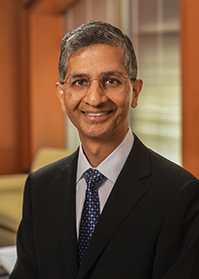 | Vikas P. Sukhatme, MD, ScD |
Like our fourth-year medical students at Match Day, leaders in the SOM have spent countless hours over the past few months considering where we want to go and how we'll get there. In early March, I carved out time with our department chairs and other leaders to focus on planning, to hear updates on several innovative current initiatives, and to discuss the development of a new research strategic plan.
The chairs also participated in a visioning exercise that is helping us to further articulate the core values and strengths of our institution. Results confirmed what we instinctively knew; a key strength of our school – and indeed, a primary reason I came to Emory – is our people. With that in mind, I want to take a moment to thank you for all that you do to make this such an amazing place to work, learn and grow. | |
| |
| 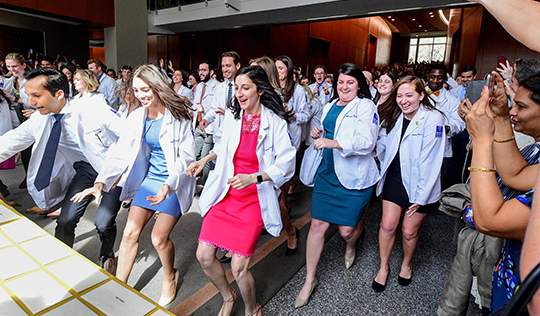 | | Congratulations to all our graduating medical students. If you missed the Match Day festivities, view the Match Day video or photo gallery.
140 students participated in the national residency matching program (NRMP) this year. Forty-seven of those will spend all or part of their residencies in Georgia, with 41 beginning their internship year at Emory.
In addition to Emory, the students matched at prominent institutions including Columbia, Duke, Harvard, Johns Hopkins, Stanford, New York University, University of California San Francisco, University of Pennsylvania, University of Washington, Vanderbilt, Washington University in St. Louis, among others. The most popular specialties chosen include: internal medicine (34), pediatrics (17), general surgery (13), orthopaedic surgery (8), emergency medicine (7), and psychiatry (7). | Read more | |
| |
| | Jonathan Pollock (surgery) shares his personal story—even the difficult parts—to let others know it’s okay to talk about a topic that has, for too long, been verboten: physician burnout.
"I hope that others will also reflect on the emotions they experience and how they affect their patients, relationships with colleagues, and personal life," says Pollock. After graduating from medical school at Emory, Pollock landed in Ethiopia, working with residents, serving as founding faculty for a new medical school, and doing research. He had found the motherlode: supportive colleagues, meaningful work, interesting cases.
Then burnout started taking its toll. Colleagues left, exhausted from being the sole surgeons at their hospitals in a low-resource country, becoming ill themselves with contagious diseases, or family demands. "To pick up the slack, I worked more," he says. "Every waking moment was spent on program finances, preparing lectures, arranging travel for exams, meeting with the government, writing test questions, teaching the medical students, in the operating room, taking call. Despite my best efforts, I neglected my family."
He tried to be more attentive, to take vacations. But the stress was, literally, killing him. His blood pressure was out of control, he was having debilitating headaches, he wasn’t sleeping and was gaining weight. "I was emotional and would burst into tears or explosions of anger," he says. "I was depressed and began have thoughts of career- or life-ending car crashes. I sought counseling and was put on medication. These helped somewhat but did not address the underlying issues of stress and too much work."
While Pollock eventually left Ethiopia and returned to the states, he understands that many of the same stresses accompany him, and other health professionals, wherever they go.
When burnout strikes, he says, doctors might feel that "work has lost its meaning," or "I have nothing left to give." There are accompanying feelings of exhaustion, cynicism, and being critical of oneself and others. "A common symptom is dread at the prospect of returning to work for another day," Pollock says.
One survey showed about 40% of U.S. surgeons met criteria for burnout and 30% screened positive for depression. Surgeons’ supervisors—academic health leaders— and trainees—surgical residents— are also at high risk for burnout. There was a strong correlation between hours worked and burnout rates. And, not surprisingly, nearly half of surgeons report work-home conflicts. Consequences are serious: less effective patient care, more errors, self-medicating with drugs or alcohol, mental and physical health problems.
The good news, he says, is that "most people will recover. Mild burnout can be self-limited and after a time, things get better. More severe cases require deep soul searching and changes to address the factors causing the chronic stress." But the onus cannot fall solely on the physician. As EVPHA Jon Lewin notes in a recent op-ed, healthcare leaders must also do more to address system and operational challenges that are contributing to physician distress.
"So how did I recover?" Pollock asks. "There is a sense in which I will never fully recover from my experiences in Ethiopia. I left a huge part of my heart there. I miss it every day and most days I wish I were still there. But I am no longer burned out or depressed. I got there through a long and grueling process of self-examination, therapy, medication, meditation, prayer, lap swimming, and most importantly, reconnecting with my family." | Learn more about WHSC efforts to heal the healers | |
| |
| 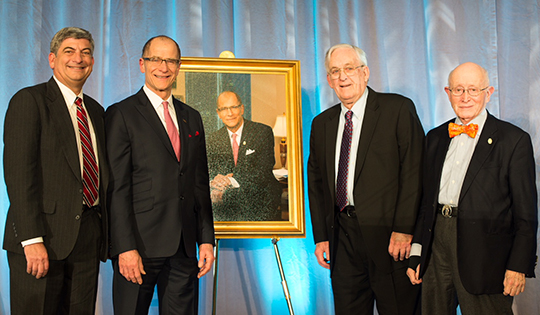 | Roberson honored for distinguished service as Orthopaedics Chair | The first event held in the new Emory Sports Medicine Complex honored James Roberson, who served as chair of the Department of Orthopaedics for 15 years. Celebrating his clinical excellence and leadership at the February 3rd event were Emory leaders, past and present faculty members, friends and family.
"It’s very clear from the moment you walk into a room—you sense his presence, his command of the situation, and the thoughtfulness that goes behind the comments that he makes," said Dean Sukhatme.
During the event, Thomas Lawley acknowledged the accomplishments that occurred under Roberson’s leadership, including creation of the Emory Orthopaedics and Spine Center, the Emory Orthopaedics and Spine Hospital, and the Emory Sports Medicine Complex. Former students also acknowledged his contributions as a teacher and mentor. Roberson taught residents "how to be responsible, compassionate, and humble physicians," said Lee Leddy, now an orthopaedic surgeon at MUSC.
Orthopaedics faculty members contributed more than $325,000 to permanently endow the Kelly Society Fund in Roberson’s honor. This fund provides educational resources and opportunities to orthopaedic residents, one of Dr. Roberson’s greatest passions. Additionally, Kelley Harrison Tison of the Luther and Susie Harrison Foundation announced the creation of the R. Harold Harrison Chair in Orthopaedic Surgery. This new chair is named for Ms. Tison’s late father, a Georgia business leader and patient of Roberson.
Interim Chair Scott Boden described his colleague as exemplifying "respect, belief, trust, loyalty, and commitment. That is why we all follow him into battle."
"What an unbelievable experience," said Roberson, summing up the evening and his career at Emory. "It has truly been a privilege and honor to serve the department." | |
| |
| 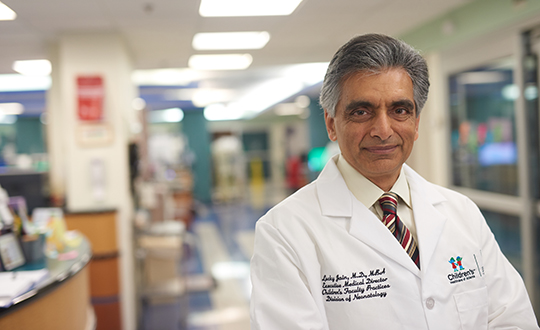 | New affiliation between Emory and Children's Healthcare of Atlanta | A new affiliation between Emory and Children’s—the Emory + Children’s Pediatric Institute—was announced in early March after more than a year of effort by physicians, investigators, leadership, and administrative staff across both institutions.
The affiliation will encompass Emory faculty whose clinical practice is based primarily at Children's. On September 1, these faculty will transition employment from Emory University to the Pediatric Institute. While their employer will change, Emory will continue to be their academic home, and their faculty appointment in the medical school will remain intact. Their supervisor, chair, and colleagues also will remain the same. "The vision for this new entity is to combine the strengths and resources of Emory and Children's in a way that elevates our shared ability to carry out our respective missions," said Lucky Jain, chair of pediatrics. "It provides a virtual infrastructure to address logistical details, remove barriers, and optimize collaboration, all to help propel us forward to achieve real progress on behalf of those we serve."
This transition includes clinicians in pediatrics as well as those in anesthesiology, radiology, surgery, cardiothoracic surgery, and otolaryngology who see patients primarily at Children's. The transition does not include Emory faculty who work only at Hughes Spalding, nor does it include basic science faculty. Those faculty will remain employed by Emory but will be part of the overall vision and mission for the institute. There are no plans for staff employment transitions at this time.
"We are committed to ensuring a smooth transition to the Pediatric Institute to minimize any disruption to the day-to-day work of caring for children, educating our pediatric workforce, and continuing our clinical and laboratory research," says Jain. "We look forward to providing additional updates in the coming year." | |
| |
| 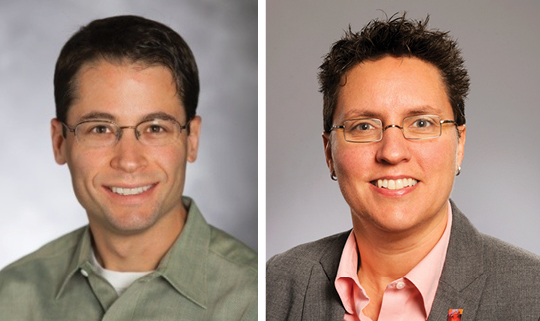 | Research leadership transitions | Josh Rosenberg and Lisa Carlson have been appointed to research leadership roles in the Dean's office, taking on a host of duties and responsibilities from Trish Haugaard, who retired from Emory in March after thirty-three years of dedicated service.
Rosenberg is serving as Executive Administrator, Research Compliance and Administration. He will oversee compliance and administrative management of the research infrastructure, including budget management for the research office and cores. Rosenberg will also manage staff and daily operations.
Carlson is Executive Administrator, Research Programs and Operations. In her role, Carlson will work alongside SOM leaders to develop and implement key research program initiatives. She will also play an integral role in research project management and operational activities. | |
| |
|  | Max Cooper (immunology) was announced as a laureate of the 2018 Japan Prize. Alongside Dr. Jacques Miller, Cooper was awarded the prize in the category "Medical Science and Medicinal Science" for the discovery of the dual nature of adaptive immunity, which identified the cellular building blocks of the immune system as we understand it today.
| | |
| | | 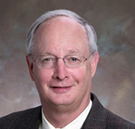 | Raymond Dingledine (pharmacology) is one of 12 foreign members to be inducted into the Norwegian Academy of Science and Letters in Oslo on May 3. New members are elected by current members based on professional achievement. The Norwegian Academy of Science and Letters, founded in 1857, is a non-governmental, nation-wide, and interdisciplinary body that embraces all fields of learning.
| | |
|
| |
| 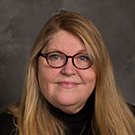 | Linda Howell (pulmonary, allergy, critical care, sleep medicine), received the 2018 Graduate Medical Education Program Coordinator Award, considered the highest honor nationally for program coordinators in GME.
| | |
| | | 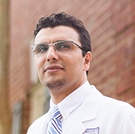 | Heval Kelli (cardiology): was honored as part of the Georgia State University inaugural 40 under 40 class.
| | |
|
| |
|  | Kimberly Manning (general medicine) was awarded the 2018 Parker J. Palmer Courage to Teach Award by the ACGME.
| | |
| | |  | Andrew Miller (psychiatry) was the 2018 recipient of the Albert E. Levy Scientific Research Award, senior faculty division; awarded by the University Research Committee in the Emory Office of the Provost.
| | |
|
| |
| 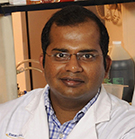 | Muralidhar Padala (cardiothoracic surgery) received the 2018 Albert E. Levy Award for Scientific Research, junior faculty division, awarded by the University Research Committee in the Emory Office of the Provost.
| | |
| | | 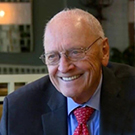 | Kenneth Walker (medicine, neurology) was awarded the Emory Medal, Emory’s highest alumni honor. Walker, who passed away in February, was a professor in both medicine and public health and was known for his love of teaching, dedication to Grady Hospital, and work in global health outreach.
| | |
|
| |
|
